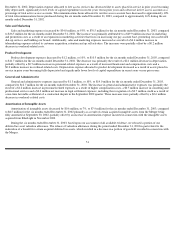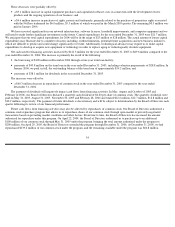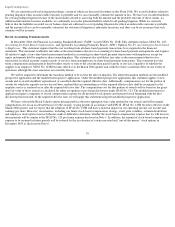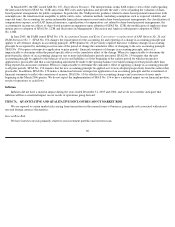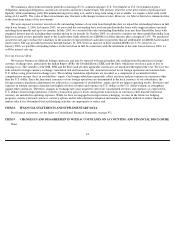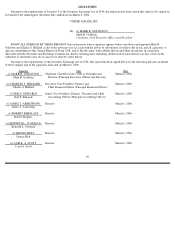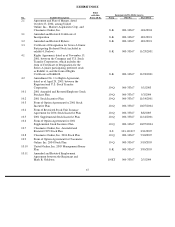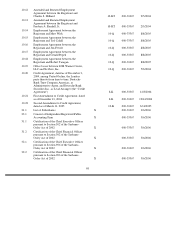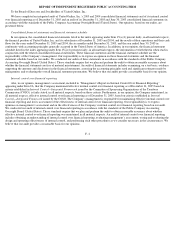Classmates.com 2005 Annual Report Download - page 61
Download and view the complete annual report
Please find page 61 of the 2005 Classmates.com annual report below. You can navigate through the pages in the report by either clicking on the pages listed below, or by using the keyword search tool below to find specific information within the annual report.
In March 2005, the SEC issued SAB No. 107, Share-Based Payment . The interpretations in this SAB express views of the staff regarding
the interaction between SFAS No. 123R and certain SEC rules and regulations and provide the staff’s views regarding the valuation of share-
based payment arrangements for public companies. In particular, this SAB provides guidance related to share-based payment transactions with
nonemployees, the transition from nonpublic to public entity status, valuation methods (including assumptions such as expected volatility and
expected term), the accounting for certain redeemable financial instruments issued under share-
based payment arrangements, the classification of
compensation expense, non-GAAP financial measures, capitalization of compensation cost related to share-based payment arrangements, the
accounting for income tax effects of share-based payment arrangements upon adoption of SFAS No. 123R, the modification of employee share
options prior to adoption of SFAS No. 123R and disclosures in Management’s Discussion and Analysis subsequent to adoption of SFAS
No. 123R.
In June 2005, the FASB issued SFAS No. 154, Accounting Changes and Error Corrections—a replacement of APB Opinion No. 20 and
FASB Statement No. 3
. SFAS No. 154 changes the requirements for the accounting for and reporting of a change in accounting principle and
applies to all voluntary changes in accounting principle. APB Opinion No. 20 previously required that most voluntary changes in accounting
principle be recognized by including in net income of the period of change the cumulative effect of changing to the new accounting principle.
SFAS No. 154 requires retrospective application to prior periods’ financial statements of changes in accounting principle, unless it is
impracticable to determine either the period-specific effects or the cumulative effect of the change. When it is impracticable to determine the
period-specific effects of an accounting change on one or more individual prior periods presented, SFAS No. 154 requires that the new
accounting principle be applied to the balances of assets and liabilities as of the beginning of the earliest period for which retrospective
application is practicable and that a corresponding adjustment be made to the opening balance of retained earnings for that period rather than
being reported in an income statement. When it is impracticable to determine the cumulative effect of applying a change in accounting principle
to all prior periods, SFAS No. 154 requires that the new accounting principle be applied as if it were adopted prospectively from the earliest date
practicable. In addition, SFAS No. 154 makes a distinction between retrospective application of an accounting principle and the restatement of
financial statements to reflect the correction of an error. SFAS No. 154 is effective for accounting changes and corrections of errors made
beginning in the March 2006 quarter. We do not expect the implementation of SFAS No. 154 to have a material impact on our financial position,
results of operations or cash flows.
Inflation
Inflation did not have a material impact during the years ended December 31, 2005 and 2004, and we do not currently anticipate that
inflation will have a material impact on our results of operations going forward.
ITEM 7A.
QUANTITATIVE AND QUALITATIVE DISCLOSURES ABOUT MARKET RISK
We are exposed to certain market risks arising from transactions in the normal course of business, principally risk associated with interest
rate and foreign currency fluctuations.
Interest Rate Risk
We have interest rate risk primarily related to our investment portfolio and our term loan.
60



